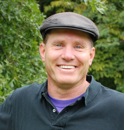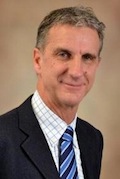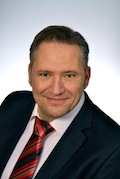Keynote Speakers
We are very pleased to have acquired the services of an excellent selection of keynote speakers for the conference. It is our aspiration that these speakers will give our delegates a view about technological and scientific activities, relating to sustainability in energy and buildings, taking place in various areas of the world.
The speakers and the titles of their talks are shown below.
John A. Boecker
AIA, LEED@ Fellow, 7groupIntegrative Thinking and Regeneration: What Are We Trying to Sustain?
More details ...
Dr Giovanni Federigo De Santi
Director, Directorate Competences, Joint Research Centre, European CommissionBehavioural Insights for a sustainable energy transition
More details ...
Dr Dirk Pietruschka
Institute for Applied Research (IAF) and zafh.net, Germany3D-City model based predictive decision making and control of decentralized urban energy systems and their intelligent interaction with smart grids
More details ...
John A. Boecker
AIA, LEED@ Fellow, 7groupIntegrative Thinking and Regeneration: What Are We Trying to Sustain?
Abstract:
Integrative Thinking and Regeneration: Through the practice of developing our thinking about how technical systems are nested within whole living systems, any project can be leveraged as a highly effective acupuncture point for helping transform community vitality and regenerating life. There are two interrelated dimensions in this work:
- At its entry level, Regenerative Design is a practice for reversing the systemic decline in living systems and creating the basis for self-renewing socio-ecological vitality.
- Regenerative Development is a continual process that builds the capacity, capability, and will of stakeholders to serve as co-designers and active participants in the continual evolutionary transformation of their unique place.
Regenerative Development and Design engages a much deeper integrative process that works beyond just building; it comprises a meta-discipline that combines the pattern thinking and practices of Ecological Design, Permaculture, Biophilia, Organizational Psychology, Neuroscience, and Integrative Design. We will experience this work through a highly interactive engagement and discussion around how building and development can be seen as an instrument for healing, sustaining, and regenerating the community of life in each unique place by re-membering that we play a participatory role in the vitality of the living systems in which we are nested.

Biography:
John Boecker is an Architect and founding partner in 7group, an internationally recognized multi-disciplinary consulting firm focused on integrative design and regenerative development. His practice has focused exclusively on sustainability since 1996. Along with his 7group partners and Bill Reed, he co-authored The Integrative Design Guide to Green Building, a seminal book published by Wiley in April, 2009. He also co-hosted with Bill Reed the national Voice America radio program, "Building Deeper Green: Reframing Sustainability".
He was the Project Architect for two of the first 15 LEED certified projects in the world, and he has served as the primary LEED Consultant on over 100 additional LEED certified projects in eight countries. John has served as a LEED Certification Reviewer contracted with GBCI since 2003 and on the USGBC LEED Steering Committee for over six years as Chair of the USGBC's Curriculum & Accreditation Committee. John also Chaired the USGBC's international Integrative Process (IP) Working Group, charged with improving the practical implementation integrative design, and he was the primary co-author of the Integrative Process (IP) credits in LEED v4. He was appointed a LEED Fellow in the inaugural class of 2011.
His design work has been recognized by over 40 design awards, including 25 Design Excellence Awards from AIA, three Pennsylvania Governor's Awards for Environmental Excellence in 1998, 2001 & 2003, and AIA's nationwide Top Ten Green Projects in 2000, 2009, and 2016. John has taught Architectural Design at Carnegie Mellon, University of Pennsylvania, Harrisburg Area Community College, and guest lectures at Harvard.
As a highly sought keynote speaker, John has facilitated workshops or lectured on the benefits of green buildings, integrative design and regenerative development in 35 states and 14 countries.
John holds a B.S. degree in Architecture from Penn State and a Master of Architecture degree from Yale University.
Dr Giovanni Federigo De Santi
Director, Directorate Competences, Joint Research Centre, European CommissionBehavioural Insights for a sustainable energy transition
Abstract:
Meeting the EU's climate change and energy policy objectives for 2030 and beyond requires a major transformation of the current power system operation and architecture, which is already undergoing significant technological, regulatory and social modifications. The Energy Union Strategy has put the energy consumer at the centre of its considerations.
In this context, smart technologies and services are essential to reap the opportunities available in an interoperable Smart Grid infrastructure, empowering consumers/prosumers in taking control of their energy consumption and self-production. Likewise, innovative solutions focusing on the demand-side of the market should be pursued, in other words consumers have an essential role to play. Traditionally, policies aimed at affecting consumers' choice have focused on price interventions and information provision. Yet, evidence shows that we do not always behave 'rationally': people are myopic (they disproportionally weight immediate costs, rather than considering potential cost-savings), they procrastinate, or struggle in contexts where they are provided with too much information/choice (such as when faced with complex energy tariffs).
In this keynote we will explore how behavioural insights - by shedding light on how people actually make choices - can contribute to sustainable energy transition. Earlier this year the Joint Research Centre (JRC), the European Commission in-house science service, published the BIAP 2016 report, showing how behavioural insights are increasingly influencing policy at national level in Europe, including in the field of energy (e.g. reducing the transaction costs of switching, using social norms to influence energy usage, improving feedback on energy consumption on bills or meters). In the near future, the JRC plans to explore this potential focusing in particular on insights from behavioural research on energy efficiency to support EU policies.

Biography:
Giovanni De Santi has been working at the Joint Research Centre (JRC) of the European Commission since 1985, where he developed his professional expertise in the fields of energy, transport and environmental science.
In 2000 he was nominated Head of the "Sustainable Transport and Air Quality" Unit, in charge for the European Reference Laboratory on air Pollution (ERLAP) and the European Vehicle Emissions Laboratory (VELA). Chairman at UN-ECE GRPE (Geneve) of Working Groups for the definition of international regulations and standards of missions from Heavy and Light Duty Vehicles (HDV & LDV).In 2007 he was nominated as Director of the Institute for Energy and Transport (IET). Responsible for the coordination and management of studies and activities within the European Commission Energy Union policy (energy security, energy efficiency, decarbonised transport, electrification of transport, energy markets, etc.) and in the frame of international cooperation between EU and key Countries such as USA (US-EPA, US-DoE), China (China-SEPA), Japan, etc. He is member of Steering Committee and Governing Board of numerous European Commission initiatives such as the European Strategic Energy Technology-Plan (SET-Plan), the Strategic Transport Research and Innovation Agenda (STRIA), the Hydrogen and Fuel Cell Joint Undertaking, etc.
Under his directorship the Institute has also developed collaboration agreements with International Organisations (IAEA, IEA, UNECE, IRENA, Africa-ECREE, etc), industrial associations (ACEA, EUROELECTRIC, CONCAWE, ENTSO-E, etc.), Universities (Delft, Madrid, Aachen, Torino) and industries (EDF, ENEL, GRS, etc.). Under his leadership the Institute is now chairing numerous international Task Forces for standardisation at UNECE, CEN-CENELEC, ISO, etc.
Teaching the course "Energy Security" at Politecnico Torino, author of peer reviewed publications in scientific journals and Chairman of Scientific Advisory Boards of International Conferences on solar energy (EU-PVSEC), bioenergy (EU-BCE), sustainable transport (EU-TRA), and of the International Energy Centre (Torino).
Since July 2016 Director of the JRC Directorate Competences.
Dr Dirk Pietruschka
Institute for Applied Research (IAF) and zafh.net, Germany3D-City model based predictive decision making and control of decentralized urban energy systems and their intelligent interaction with smart grids
Abstract:
Model based predictive control tools found already a quit broad application in the intelligent control of buildings, where such tools are used to increase the energy efficient HVAC system operation. However, due to the increased share of sustainable energy technologies the urban energy system focuses a significant change from a centralized generation and supply structure to a more and more decentralized system. As most of the renewable energy sources are strongly fluctuating over the day and year, intelligent control mechanisms are needed to stabilize the energy distribution networks. Energy system modelling combined with weather forecast data can provide the required information well in advance and delivers the required information for an intelligent load and storage management. 3D-City models combined with simulation tools, weather forecast data and an intelligent data management significantly reduce the effort for the energy system modeling and provide additionally useful geometrical information on shading effects. In future smart grids this information will be used to adapt the demand and the controllable local energy generation to the needs of the local and higher level transfer grids. Within the presentation examples on the structure and application of these powerful tools for the control of urban energy systems will be shown.

Biography:
Dr. Dirk Pietruschka studied building physics at University of Applied Sciences in Stuttgart. Afterwards he was working for 10 years as engineer for building physics at DS-Plan in Cologne and at DEKRA Umwelt GmbH in Stuttgart. From October 2012 until April 2014 he studied in the master course SENCE 'Sustainable Energy Competence' at the Universities of Applied Sciences in Stuttgart, Ulm and Rottenburg. Since 2004 he is working as researcher at University of Applied Sciences Stuttgart. From 2005 to 2010 he was PhD student at the De Montfort University in Leicester, UK. The topic of his PhD was 'Model Based Control Optimization of Renewable Energy Based HVAC Systems'. From August 2007 to October 2013 he was as general manager of the center for sustainable energy technologies (zafh.net) responsible for the research development in the area of renewable energy systems and building physics. Since October 2013 he is managing director of the Institute for Applied Research (IAF) and vice director of zafh.net. Here he is responsible for the development of new interdisciplinary research areas in the field of intelligent highly energy efficient districts and cities and for further development of international cooperation.



